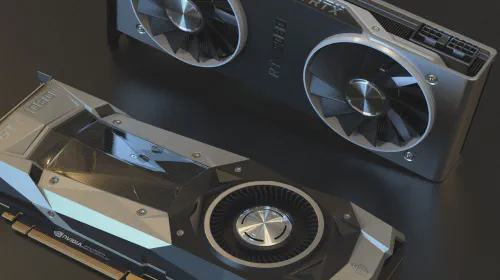Quantum Computing Vs Supercomputer - A Comprehensive Comparison
Salomon Kisters
Jul 12, 2023This post may contain affiliate links. If you use these links to buy something we may earn a commission. Thanks!
Welcome to our blog post on quantum computing versus supercomputers.
In today’s rapidly advancing technological landscape, it’s essential to understand the differences and similarities between these two powerful computing systems.
In this post, we will delve into the practical aspects of quantum computing and supercomputers, discussing their architectures, capabilities, limitations, and applications.
By the end, you will have a clear understanding of how these cutting-edge technologies compare and how they can potentially revolutionize various industries.
Introduction to Quantum Computing and Supercomputers
Before we delve into the comparison, let’s briefly define quantum computing and supercomputing.
Quantum computing utilizes principles from quantum mechanics to perform complex computations. Instead of the classical binary system of 0s and 1s, quantum computers use quantum bits or qubits that can exist in multiple states simultaneously, thanks to quantum superposition and entanglement.
On the other hand, supercomputers are high-performance computing machines capable of solving complex computational problems at incredible speeds, leveraging parallel processing, multicore architectures, and advanced algorithms.
Architecture: Fundamental Differences that Set Them Apart
The architecture of a computing system plays a crucial role in determining its capabilities and limitations. When comparing quantum computing and supercomputers, it’s important to understand their fundamental architectural differences.
Quantum Computing Architecture
Quantum computers primarily consist of three essential components: qubits, quantum gates, and a quantum processor. Qubits are the building blocks of quantum computing, representing information encoded in quantum states.
Quantum gates manipulate these quantum states during computations, evolving the qubits from one state to another. The quantum processor is responsible for executing these quantum gate operations. Quantum computers also require a sophisticated cooling mechanism to maintain extremely low temperatures for the qubits to remain stable.
Supercomputer Architecture
Supercomputers are designed with parallelism in mind. They consist of a large number of interconnected processors, commonly in the form of multicore architectures, working together to execute computations concurrently.
These processors are typically connected using high-speed interconnects, enabling efficient communication and data sharing. Supercomputers are optimized for massive data processing and storage, utilizing advanced algorithms and software libraries to harness their computational power.
Computing Power: Speed and Performance Comparison
When it comes to computing power, both quantum computers and supercomputers offer impressive capabilities, albeit in different ways. Let’s explore how they compare in terms of speed and performance.
Quantum Computing Power
Quantum computers have the potential to perform certain computations exponentially faster than classical computers for specific problem types. This is due to the inherent parallelism provided by qubits and their ability to process massive amounts of information simultaneously.
However, it’s important to note that quantum computers are primarily designed for solving specific problem classes, such as optimization, simulation, and cryptography, rather than general-purpose computing tasks.
Supercomputing Power
Supercomputers, as the name suggests, are designed to deliver unmatched computing power. They excel in executing highly complex simulations, large-scale data analytics, and computationally intensive scientific calculations.
With their superior parallel processing capabilities, supercomputers can efficiently divide tasks among multiple processors, drastically reducing computation time. As a result, they can solve complex problems that would be impractical or infeasible for a regular computer.
Error Rates: Reliability and Stability in Computation
Error rates play a significant role in the reliability and stability of computing systems. Both quantum computers and supercomputers face unique challenges in this regard.
Quantum Computing Error Rates
Quantum computers are prone to errors due to the phenomenon of quantum decoherence and the sensitivity of qubits to external influences. These errors can accumulate over the course of a computation, potentially compromising the reliability of the results.
Error correction techniques are being developed to mitigate these issues, but they require additional qubits dedicated to error detection and correction, further complicating the hardware requirements and increasing computational overhead.
Supercomputing Error Rates
While supercomputers can also encounter errors, their error rates are comparatively lower than those of quantum computers. The reliability and stability of supercomputers largely depend on the quality of the hardware components, cooling systems, and robust error-checking mechanisms.
With incremental advances in technology, error rates in supercomputers have been greatly reduced, ensuring highly accurate and reliable computations.
Scalability: Future Growth Potential
Scalability is a vital consideration for any computing system, as it determines the potential for future growth and increased performance.
Quantum Computing Scalability
Quantum computing faces several scalability challenges. As the number of qubits increases, so does the complexity of managing and controlling quantum states.
Additionally, the problem of quantum decoherence becomes more pronounced with larger systems. Researchers are actively exploring ways to overcome these hurdles, such as creating error-resistant qubits, developing fault-tolerant quantum computing architectures, and optimizing quantum algorithms.
While progress is being made, widespread scalability is still a significant hurdle for quantum computing.
Supercomputing Scalability
Supercomputing architectures are highly scalable, with many supercomputers already utilizing thousands of processors. Parallel processing allows supercomputers to efficiently distribute computational tasks among numerous cores, ensuring scalability and increased performance.
Moreover, advancements in interconnect technology and software development enable seamless integration of additional processors, facilitating continuous expansion and enhanced computational capabilities.
Applications: Real-World Potential and Impact
Finally, let’s explore the practical applications of quantum computing and supercomputers. Understanding their real-world potential and impact is essential in determining their value and relevance in various industries.
Quantum Computing Applications
Quantum computing holds significant promise in several fields, particularly in solving optimization problems, simulating molecular dynamics, enhancing cryptography, and machine learning.
For example, it could revolutionize drug discovery by accurately simulating molecular interactions and speeding up the identification of potential drug candidates. Additionally, quantum computers have the potential to break current encryption algorithms, necessitating the development of quantum-resistant cryptography.
Supercomputing Applications
Supercomputers have already made significant contributions in a wide range of scientific and engineering domains. They have been instrumental in climate modeling, astrophysics simulations, genetic research, and complex physics calculations.
Supercomputers also play a vital role in artificial intelligence advancements, enabling the training of deep learning models on massive datasets and accelerating data-driven decision-making processes across various industries.
Conclusion
In conclusion, quantum computing and supercomputers represent two distinct but incredibly powerful computing technologies.
Quantum computers offer the potential for exponential speedup in specific problem domains but face challenges related to error rates and scalability. On the other hand, supercomputers excel in providing immense parallel computing power, delivering accurate results that have a profound impact across multiple scientific and computational domains.
As both fields continue to advance, we can expect to see a convergence of these technologies, creating synergies that will shape the future of computing and revolutionize the capabilities of human ingenuity.
Remember, quantum computing and supercomputers are not mutually exclusive but rather complementary technologies. By harnessing their unique strengths, we can pave the way for remarkable advancements that benefit society as a whol
Stay informed with the latest insights in Crypto, Blockchain, and Cyber-Security! Subscribe to our newsletter now to receive exclusive updates, expert analyses, and current developments directly to your inbox. Don't miss the opportunity to expand your knowledge and stay up-to-date.
Love what you're reading? Subscribe for top stories in Crypto, Blockchain, and Cyber-Security. Stay informed with exclusive updates.
Please note that the Content may have been generated with the Help of AI. The editorial content of OriginStamp AG does not constitute a recommendation for investment or purchase advice. In principle, an investment can also lead to a total loss. Therefore, please seek advice before making an investment decision.

How Many Ethereum Are There, and How Many Are Left?
One of the first questions asked by Ethereum enthusiasts is how many Ethereum are in circulation and how many are left. Let's have a look.

Ethics of E-Waste: Understanding Tech's Environmental Impact
Learn about the ethics of e-waste and the environmental impact of technology. Discover solutions and initiatives to address this growing problem.

Ethereum vs. Cardano - What's the Difference?
Those who are well versed in the world of cryptocurrency undoubtedly know about the Cardano vs. Ethereum debate. Let's explore.
Protect your documents
Your gateway to unforgeable data. Imprint the authenticity of your information with our blockchain timestamp